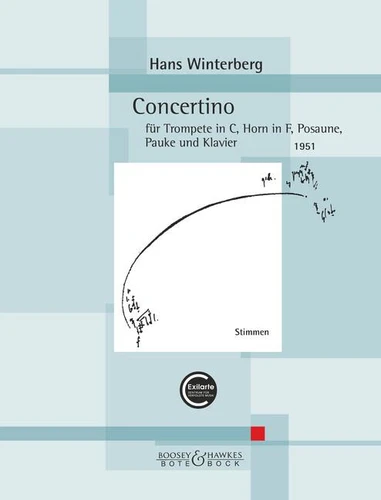Concertino. Für Trompete in C, Horn in F, Posaune, Pauke und Klavier
Par :Formats :
Actuellement indisponible
Cet article est actuellement indisponible, il ne peut pas être commandé sur notre site pour le moment. Nous vous invitons à vous inscrire à l'alerte disponibilité, vous recevrez un e-mail dès que cet ouvrage sera à nouveau disponible.
- Nombre de pages52
- PrésentationBroché
- FormatPartition
- Poids0.217 kg
- Dimensions23,1 cm × 30,3 cm × 0,0 cm
- ISBN978-3-7931-4621-6
- EAN9783793146216
- Date de parution12/11/2025
- ÉditeurBoosey & Hawkes Bote & Bock
Résumé
In addition to the Piano Concerto No. 1 and the Suite for Viola and Piano, this unusually scored Concertino is one of the earliest works that Winterberg composed after moving from Prague to Munich in 1947. In that year, Fritz Rieger, his old fellow student in Zemlinsky's conducting class, had premiered Winterberg's First Symphony, written in Prague in 1934/35, in Mannheim - it was the most important performance of one of the composer's works to date, and Winterberg could not only hope a new beginning after "Zero Hour", but also for the real start of a career that had been denied in Prague from 1939 due to persecution and imprisonment on account of his Jewish origins.
In contrast to important symphonic works, three piano concertos and string quartets, which were premiered and broadcast in Munich from 1950, Winterberg's chamber music for wind instruments - among thiem the Concertino - remained unperformed and unpublished during the composer's lifetime. With its rhythmic splendor, its unshakeable "Elan vital" and the humorous play with the eccentric combination of instruments, the piece seems like a reminder of the lost world of Dadaist surrealism in Prague between the wars.
Instrumentation : trumpet in C, horn in F, trombone, timpani and piano
In contrast to important symphonic works, three piano concertos and string quartets, which were premiered and broadcast in Munich from 1950, Winterberg's chamber music for wind instruments - among thiem the Concertino - remained unperformed and unpublished during the composer's lifetime. With its rhythmic splendor, its unshakeable "Elan vital" and the humorous play with the eccentric combination of instruments, the piece seems like a reminder of the lost world of Dadaist surrealism in Prague between the wars.
Instrumentation : trumpet in C, horn in F, trombone, timpani and piano
In addition to the Piano Concerto No. 1 and the Suite for Viola and Piano, this unusually scored Concertino is one of the earliest works that Winterberg composed after moving from Prague to Munich in 1947. In that year, Fritz Rieger, his old fellow student in Zemlinsky's conducting class, had premiered Winterberg's First Symphony, written in Prague in 1934/35, in Mannheim - it was the most important performance of one of the composer's works to date, and Winterberg could not only hope a new beginning after "Zero Hour", but also for the real start of a career that had been denied in Prague from 1939 due to persecution and imprisonment on account of his Jewish origins.
In contrast to important symphonic works, three piano concertos and string quartets, which were premiered and broadcast in Munich from 1950, Winterberg's chamber music for wind instruments - among thiem the Concertino - remained unperformed and unpublished during the composer's lifetime. With its rhythmic splendor, its unshakeable "Elan vital" and the humorous play with the eccentric combination of instruments, the piece seems like a reminder of the lost world of Dadaist surrealism in Prague between the wars.
Instrumentation : trumpet in C, horn in F, trombone, timpani and piano
In contrast to important symphonic works, three piano concertos and string quartets, which were premiered and broadcast in Munich from 1950, Winterberg's chamber music for wind instruments - among thiem the Concertino - remained unperformed and unpublished during the composer's lifetime. With its rhythmic splendor, its unshakeable "Elan vital" and the humorous play with the eccentric combination of instruments, the piece seems like a reminder of the lost world of Dadaist surrealism in Prague between the wars.
Instrumentation : trumpet in C, horn in F, trombone, timpani and piano

